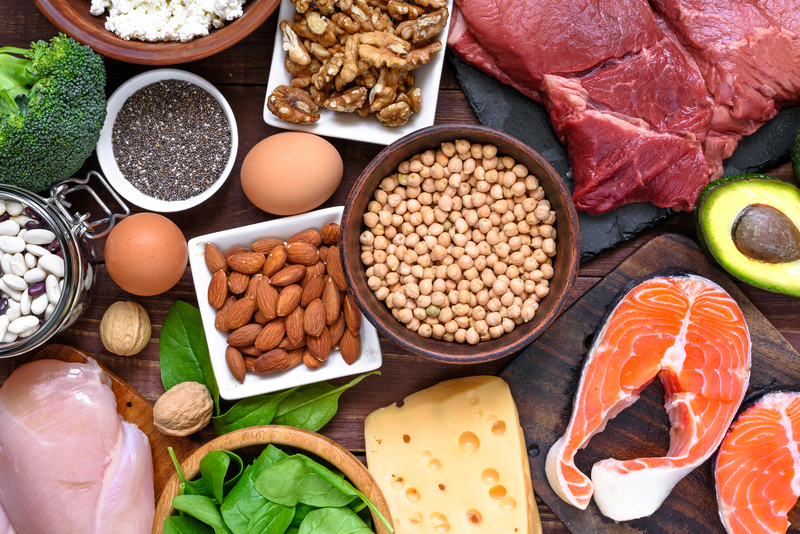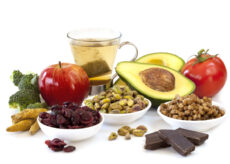Protein Deficiency: See If You’re Getting Enough Protein Daily

The protein hype is here, and it’s here to stay—for good reason. Protein is a key building block of good health as it is a key component in so many parts of the body. 1 We already know protein is essential, but when thinking about protein, a few questions may come to mind. How do you know if you’re getting enough protein in your diet? And if you don’t know how much protein you should be getting, how can you tell if you have a protein deficiency?
Protein is responsible for so much; in fact, it could be considered the body’s most essential nutrient. It’s required for maintaining our bones, muscles, organs, skin, and nails. Even more, protein can help keep the systems of the body running properly. That includes the immune, endocrine, and respiratory systems. 1
Since protein is such a critical component to our bodies, we should understand how much we need to be in the best health possible, right?
What EXACTLY is Protein?
Protein is a part of a group called macronutrients, which include fat, protein, and carbohydrates. These are types of food the body requires a lot of and are an essential part of the diet. Proteins in particular are made up of smaller components called amino acids. 2
There are 20 different amino acids. Some of these can be made by the body on its own, whereas others must be obtained from the foods we eat.2 Those our bodies are unable to make on its own are called essential amino acids. And, some proteins lack all the essential amino acids we need. This is where the terms complete vs. incomplete proteins come from.
Complete proteins are foods that contain the nine essential amino acids our bodies need: leucine, histidine, isoleucine, phenylalanine, lysine, methionine, tryptophan, threonine, and valine. They typically come from animal sources like meats, fish, eggs, and dairy products, though there are some plant proteins that also contain all of the essential aminos, such as quinoa and chia seeds.
Incomplete proteins are commonly found in plant sources and are typically missing one or more of the amino acids our bodies need. No worries, though, if you do not consume much or any animal products. Incomplete proteins can be made complete by consuming “complementary proteins,” which are two separate food sources that together contain the amino acids the other may be missing. You don’t even need to consume complementary proteins together. You can get all the amino acids you need by maintaining a healthy and varied diet that provides all the amino acids throughout a day.
How Much Protein Do You Need
Now that we know what protein is and what it’s made up of, let’s get back to the topic of discussion: Are you getting enough protein to avoid protein deficiency?
The amount of protein needed depends on many factors, such as health status, age, weight, gender, muscle mass, and activity level.1
The Dietary Reference Intake or RDI of protein for a healthy adult is around 0.36 grams per pound of body weight. This is about 56 grams per day for the average sedentary man and 46 grams per day for the average sedentary woman. 3 With this in mind, odds are, you probably are consuming enough protein for your body to function day to day.
But if you want to optimize your health, then you may want to consider consuming much higher amounts of protein daily.
The Power of High-Protein Diet
High-protein diets have been shown to improve health and metabolic function as well as help folks maintain a healthier body weight with less fat and more muscle. For people who want to consume a high-protein diet who are exercising regularly, it is recommended that protein intake be increased to 0.73 grams per pound of body weight. Yes, that’s a LOT MORE than the RDI suggested above, yet research has demonstrated one can safely consume up to two grams of protein per pound of bodyweight. 3
One of the most well-known benefits of consuming a diet high in protein is how it boosts metabolism simply by its own thermogenic effect. 2,4,5,6 This means more energy is required to digest and break down protein. Therefore, you’re using more calories when you’re consuming protein. Further, if you’re using more calories to break down your food, your body is less likely to store the calories from protein as fat or excess body weight. 7
Not only can protein aid in enhancing metabolism, but consuming more protein is also good for your brain. Protein is essential for getting nutrients to the brain. Similarly, the brain is constantly producing neurotransmitters so the brain and body can communicate. 8 These neurotransmitters are made up of amino acids—the fundamental components of protein. Consuming a diet higher in protein can increase neurotransmitter production and optimize brain function to help improve mental clarity and reduce brain fog. 8
Most importantly, consuming more protein can help reduce your risk for disease and illness. Following a high-protein diet has been linked to decreasing risk for heart attacks and strokes because it can lower blood pressure, cholesterol, and triglycerides. 9,10 Additionally, since antibodies and interferons—which are a part of the immune system—rely on protein to function, consuming adequate amounts of protein can lead to a better immune function and even fewer colds. 11
Many of the benefits seen with high-protein diets could be contributed to the fact that consuming more protein increases satiety. 12 This means those who eat more protein have a more satisfied feeling of fullness, which can then reduce calorie intake as well as decrease cravings throughout the day. This could also be due to protein decreasing levels of the hormone ghrelin, also known as the “hunger hormone.” 13
In turn, protein increases the production of hormones that help keep you feeling full. 14 As a result of higher satiety and balancing your hormones, one will likely consume fewer calories in the form of carbohydrates and fat, making protein a great option when it comes to managing weight and body composition.
Increasing Your Protein Intake
Aside from all the great health benefits we can experience from consuming protein, it is also important to make sure you are getting enough protein to avoid a protein deficiency. Although this condition is considered rare, it is essential to make sure you completely eliminate your risk as it may lead to adverse health effects.
You see, protein deficiency can lead to fatty liver, edema, bone fractures, and hypoproteinemia (abnormally low level of protein in the blood). 1,3 Signs you may be under-consuming protein include brittle hair and nails, muscle loss, low energy or feeling weak, and a compromised immune system. 3
And as we get older, protein intake becomes even more important as aging adults are at the highest risk for under-consuming protein. This is because older adults require more protein per weight than younger people do. 15 As we age, our body composition changes. Most noticeably, we tend to lose muscle mass. 16 This can contribute to increased skin fragility, decreased immune function, poor healing, longer recovery from illness, and even developing sarcopenia (the loss of muscle tissue as we age) or osteoporosis (when the bones become brittle and fragile). 16,17,18
Now that you know the importance of ensuring you’re consuming enough protein, you may feel a bit intimated, especially when trying to implement changes in your own life. Honestly, at times I even feel intimidated and overwhelmed about how I should go about changing my diet. Fortunately, high-protein diets don’t need to be a huge undertaking. As with any change, simple steps can be taken to reach your goals. Some easy ways to increase your protein intake are to:
- Start your day with a high-quality protein shake like BioTRUST Low Carb, Platinum1™, or Harvest Complete Vegan Plant Protein
- Choose protein-packed snacks like nuts and plain Greek yogurt
- Include a high-protein food with every meal, such as chicken, fish, legumes, quinoa, hemp or chia seeds.
There is so much evidence supporting a high-protein diet. However, eating a diet high in protein every single day may not be for everyone. And truthfully, for some, it is not something that needs to be done each and every day. Your main focus should be to make sure you are nourishing your body with a varied diet that gives you the right amount of protein for you and your lifestyle.
That said, if you want to experience all the exceptional benefits for your metabolism and overall health, consuming a high-protein diet may be the next step to a healthier you.







